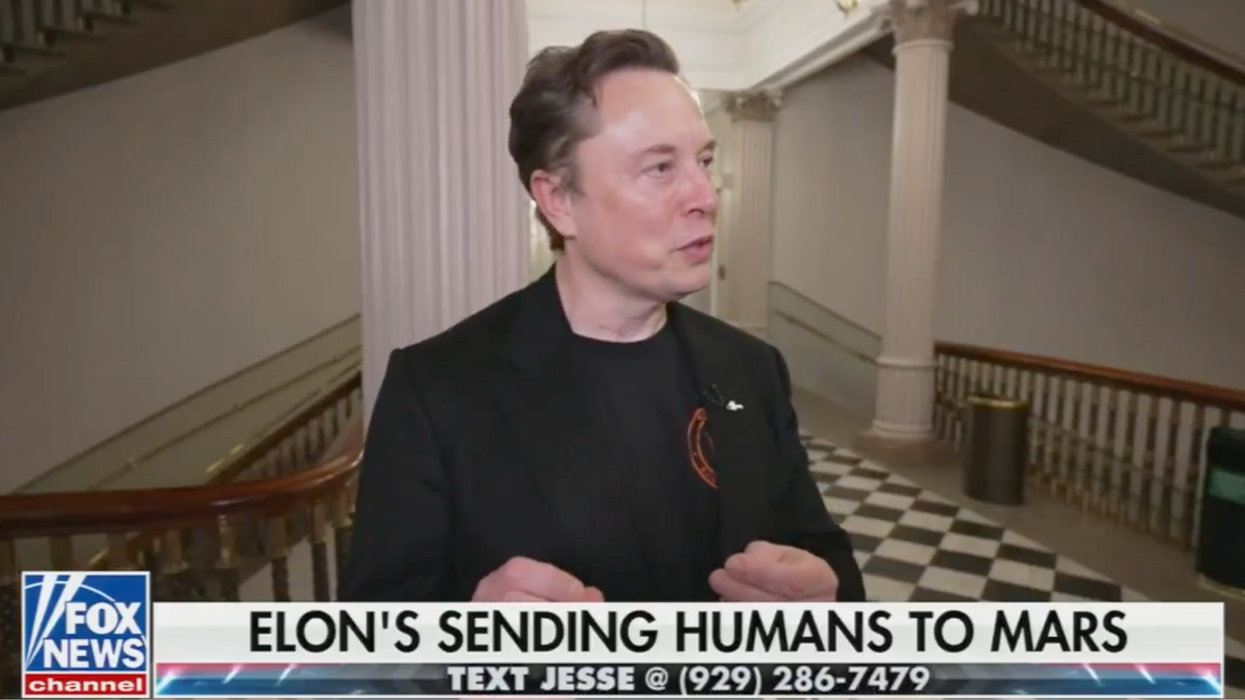Billionaire Elon Musk was given a blunt reminder about what will actually destroy life on Earth after he claimed in an interview with Fox News personality Jesse Watters that he's he's looking to colonize Mars and other planets because the Sun will eventually destroy life on Earth
The Sun, our life-sustaining star, is essentially a massive nuclear reactor, continuously converting hydrogen into helium through fusion and radiating energy outward. But like all stars, it has a finite lifespan. Scientists estimate that the Sun will exhaust its core hydrogen supply in about five billion years, marking the beginning of the end of its stable life.
According to Musk—who is clearly ignoring the science—humanity needs to act before the Sun wipes all of us out:
"One of the benefits of Mars is life insurance for life collectively. Eventually, all life on Earth will be destroyed by the Sun. The Sun is gradually expanding, and so we do, at some point, need to be a multi-planetary civilization because Earth will be incinerated.”
"We have several hundred million years. But if Earth has been around for one-and-a-half billion years, which is what the fossil record suggests, then Earth only has about 10% more life in it before it gets so hot that life is impossible."
"We have a long way to go because it's not about landing on Mars and leaving flags and footprints. It's about creating a self-sustaining city on Mars, the fundamental fork in the road of destiny is that Mars is sufficiently self-sustaining."
Musk went on to say that if Mars becomes dependent on "supply ships" from Earth, then "we have not created life insurance for life collectively."
You can hear what Musk said in the video below.
Musk’s reassurance that humans have “a few hundred million years” before worrying about the sun ignores far more immediate existential threats. At our current pace, unchecked climate change or nuclear conflict could drive humanity—and countless other species—to extinction within mere centuries.
Even if we somehow avoid those disasters, Earth will likely become uninhabitable for humans long before the sun expands. In about 1.3 billion years, rising temperatures and humidity levels will make the planet physiologically unlivable for us. By two billion years, the oceans may evaporate entirely as the sun grows about 20% more luminous.
Some resilient lifeforms—like heat-loving extremophiles in ocean vents—may persist, but humanity won’t be among them unless we fundamentally change course or leave Earth altogether.
Musk was swiftly called out.
You might want to actually pick up a book, Elon.








 Roberto Schmidt/AFP via Getty Images
Roberto Schmidt/AFP via Getty Images





 u/pizzaratsfriend/Reddit
u/pizzaratsfriend/Reddit u/Flat_Valuable650/Reddit
u/Flat_Valuable650/Reddit u/ReadyCauliflower8/Reddit
u/ReadyCauliflower8/Reddit u/RealBettyWhite69/Reddit
u/RealBettyWhite69/Reddit u/invisibleshadowalker/Reddit
u/invisibleshadowalker/Reddit u/Wishnik6502/Reddit
u/Wishnik6502/Reddit u/kateastrophic/Reddit
u/kateastrophic/Reddit u/blking/Reddit
u/blking/Reddit u/SlagQueen/Reddit
u/SlagQueen/Reddit u/geezeslice333/Reddit
u/geezeslice333/Reddit u/meertaoxo/Reddit
u/meertaoxo/Reddit u/crystal_clear24/Reddit
u/crystal_clear24/Reddit u/stinkpot_jamjar/Reddit
u/stinkpot_jamjar/Reddit
 u/Bulgingpants/Reddit
u/Bulgingpants/Reddit
 @hackedliving/TikTok
@hackedliving/TikTok @hackedliving/TikTok
@hackedliving/TikTok @hackedliving/TikTok
@hackedliving/TikTok @hackedliving/TikTok
@hackedliving/TikTok @hackedliving/TikTok
@hackedliving/TikTok @hackedliving/TikTok
@hackedliving/TikTok @hackedliving/TikTok
@hackedliving/TikTok @hackedliving/TikTok
@hackedliving/TikTok @hackedliving/TikTok
@hackedliving/TikTok @hackedliving/TikTok
@hackedliving/TikTok
 @vanderjames/Instagram
@vanderjames/Instagram @vanderjames/Instagram
@vanderjames/Instagram @vanderjames/Instagram
@vanderjames/Instagram @vanderjames/Instagram
@vanderjames/Instagram @vanderjames/Instagram
@vanderjames/Instagram @vanderjames/Instagram
@vanderjames/Instagram @vanderjames/Instagram
@vanderjames/Instagram @vanderjames/Instagram
@vanderjames/Instagram @vanderjames/Instagram
@vanderjames/Instagram @vanderjames/Instagram
@vanderjames/Instagram